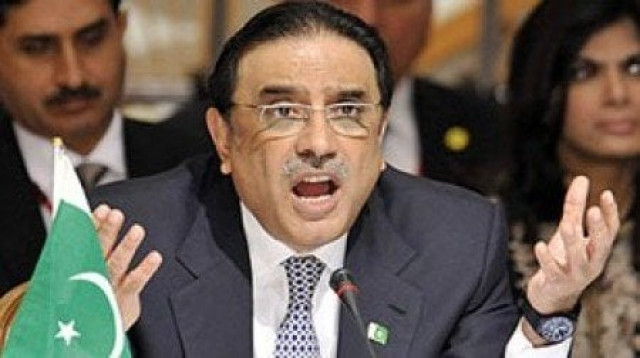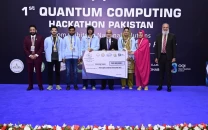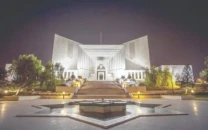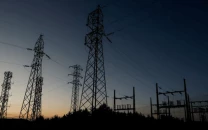Dual office case: Court advises president to relinquish political office
LHC says activities are inconsistent with the neutrality of the presidential office.

The Lahore High Court on Thursday ruled on a petition that it “expected” President Asif Ali Zardari to suspend all his political activities on the grounds that these activities were inconsistent with the neutrality and independence of the presidential office.
The petition was filed by the Pakistan Lawyers Forum (PLF) through Advocate AK Dogar in 2009 on the dual offices of the president. In March, the court had reserved its judgment on the same case.
This time around a four-member bench headed by Chief Justice Ijaz Ahmed Chaudhry issued the 33-page judgment in reference to a Supreme Court verdict on the Nawaz Sharif vs President of Pakistan (PLD 1993 SC) case, which held that the duties and functions of the presidential office are to be discharged with neutrality and impartiality.
The bench said “it is expected that the president of Pakistan will disassociate himself from political office at the earliest” and will “cease the use of the premises of the presidency for the purposes and political meetings of his party.”
It declared that the president’s participation in party decisions was “extraneous to the duties and functions of his high constitutional office”.
Citing a newspaper report, the bench held that there is “ample evidence that the meetings of the party in government, of which the president is a co-chairperson, are regularly held in the presidency.”
In its written order, the court clarified that it was not a case for disqualification of the president, nor is it a case for prohibitory order because the president’s activities are not barred under law.
It also pointed out that when “the highest office of the state becomes controversial” the unity of the state begins to erode.
The bench drew a distinction between the functions and duties of presidential office and that of political office, noting that the latter stemmed from the “personal and private association of the president with his political party”. These actions therefore do not enjoy immunity from the judicial process and call for judicial intervention to enforce the constitution, the court said in its ruling.
The president cannot, for instance, be held responsible for any poor political decision made by the government. Under Article 48 (1) of the constitution, the president is shielded from any political backlash since it is the executive alone that is made accountable for its decisions.
Another constitutional clause (Article 218 ) allows the president to participate in the affairs of a political party and grant immunity to the holder of the office.
Referring to another civil miscellaneous application of the petitioner seeking disqualification of the president, the bench held, “As visualised in Article 47 of the constitution recourse of disqualification is available only with parliament in its joint session and the court shall not by collateral means transgress that constitutional limitation.”
The court further said it was aware that the high office of the president enjoys immunity from certain legal proceedings. On this note, the bench disposed the matter.
Speaking to journalists after the hearing, Dogar said he would to file a contempt-of-court petition if the president does not relinquish his political office.
He also claimed that the judgment had directed the president to give up his political office by Thursday evening.
Reacting to the judgment, former federal law minister Babar Awan said there is no law in Pakistan which restricts the president from participating in politics. He cited Article 17 of the constitution and said that every citizen of Pakistan has the right to take part in politics.
Parliament has three components: the National Assembly, the Senate and the presidency. Both houses are political and it will be the first time in the world that the third part is not allowed to do politics, Awan said. According to him, the constitution does not define politics.
Meanwhile, the president of the Supreme Court Bar Association, Asma Jahangir, said: “Although I have not read the judgment, according to my perception it is not appropriate to ask the president what to do and what not to.”
Published in The Express Tribune, May 13th, 2011.



















COMMENTS
Comments are moderated and generally will be posted if they are on-topic and not abusive.
For more information, please see our Comments FAQ